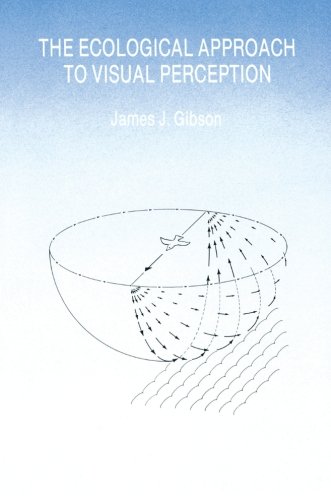James J. Gibson: The Ecological Approach to Visual Perception (1979–) [EN, RU]
Filed under book | Tags: · ambience, ecology, environment, image, information, light, media, movement, object, perception, perspective, psychology, surface, vision

“James J. Gibson (1904–1979) is one of the most important psychologists of the 20th century, best known for his work on visual perception. He received his Ph.D. from Princeton University and his first major work was The Perception of the Visual World (1950) in which he rejected behaviorism for a view based on his own experimental work. In his later works, including The Ecological Approach to Visual Perception (1979), Gibson became more philosophical and criticized cognitivism in the same way he had attacked behaviorism before, arguing strongly in favor of direct perception and direct realism, as opposed to cognitivist indirect realism. He termed his new approach ‘ecological psychology’.”
“He moved from thinking about what patterns could act as stimuli to rethinking the concept of the stimulus itself, ultimately rejecting “stimulus” in favor of his version of “information.” In a 1960 paper that is a classic in its own right, Gibson carefully surveyed the patch work of meanings of the term “stimulus” that could be found in the literature. He concluded that the optical (or acoustic, or haptic etc.) patterning that would best correspond to actual perceiving in the world no longer seemed like a “stimulus” at all in any proper sense. Instead, he proposed a common-sense usage of the term “information” (as opposed to the technical usage of Shannon) which was fairly well developed by that time. By information, Gibson meant structured energy that was information about environmental sources, in contrast to information as structure in an information theoretical sense which implies a sender and a receiver. Gibson’s information is specific to its environmental sources though not a replica or a copy. It certainly is not a stimulus in the sense of energy that triggers a response. Gibson’s information does not come to the animal. The animal goes to it, actively obtaining the information. Part 2 of this volume develops this concept of information and is at the heart of Gibson’s theory.” (from the Introduction)
“Gibson’s legacy is increasingly influential on many contemporary movements in psychology, particularly those considered to be post-cognitivist.”
Publisher Houghton Mifflin, Boston, 1979
This edition, Psychology Press, 2014
ISBN 9781315740218
315 pages
Reviews and commentaries: E. Bruce Goldstein (Leonardo, 1981), Frederick A. Jules (1984), A. P. Costall (Journal of the Experimental Analysis of Behavior, 1984), Maurizio Ferraris (1999, IT), William M. Mace (Ethics & the Environment, 2005).
Wikipedia, FR
Publisher
WorldCat
The Ecological Approach to Visual Perception (English, 1979/2014, 4 MB)
Ekologicheskiy podchod k zritelnomu vospriyatiyu (Russian, trans. T.M. Sokolskoy, 1988, 11 MB)
For more on Gibson see Monoskop wiki.
Comment (1)
